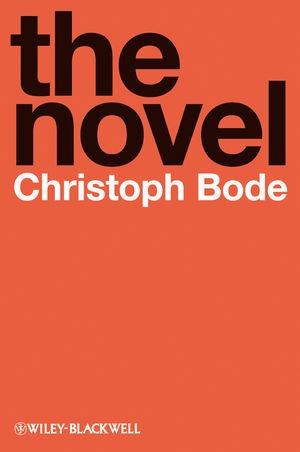Partager
Fr. 55.50
Christoph Bode
Novel - An Introduction
Anglais · Livre de poche
Expédition généralement dans un délai de 3 à 5 semaines
Description
Informationen zum Autor Christoph Bode is Chair of Modern English Literature at the Ludwig Maximilians University of Munich, Germany. He has written 20 books and some 70 articles - both in English and German - on Narratology, Romanticism, and Critical Theory. Bode is also President of the German Society for English Romanticism and a Corresponding Fellow of the English Association. Klappentext This is an engaging introduction to the novel and narrative theory that will deepen readers' understanding and enhance their appreciation and enjoyment of this popular genre.* Provides readers with the critical tools to become expert narratologists and more insightful readers* Reflects on the rise of world literature, with examples drawn from Spanish, French, Italian, German, Scandinavian, and Russian novels for analysis or illustration, as well as works from English and American literature* Featured topics include the handling of space and time in the novel, narrative situations, literary symbols, and gendering Zusammenfassung By subjecting established critical models and recent developments in the field to an original critique, The Novel provides readers with a lucid introduction to narrative theory. It reveals how narratological analysis is not an end in itself, but serves to deepen our understanding and enhance our enjoyment of literary works. Inhaltsverzeichnis Preface. Translator's Note. Acknowledgments. 1. Beginnings: What Do You Expect? 1 Beginning. 2 Sense and Meaning. 3 Rules of the Game. 4 Links and Connections. 5 I. 6 First Sentences: Enticements. 2. The Modern European Novel: Predecessors, Origins, Conventions, Sub-Genres . 1 Dangers and Allurements of Novel-Reading: What's Novel about the Novel? 2 Fact and Fiction: No Man is an Island. 3 Fiction, Illusion, Realism. 4 Variety of Types: Triumph of Polyphony. 3. The Object of Every Analysis: The How of the What (Discourse and Story) . 4. Time . 1 Narrative Time and Narrated Time. 2 Order. 3 Frequency. 4 Tense and Narrative. 5. Characters. 1 Character Conception. 2 Character Portrayal . 6. Teutonic Rosette or Gallic Taxonomy? Identifying the Narrative Situation . 1 Prologue. 2 Stanzel's Typological Circle: A Preliminary Overview. 3 Splitting the In-dividual: The First-Person Narrative Situation. 4 The Impossibility of the Familiar: The Authorial Narrative Situation. 5 Abolishing Narrative in Narrative - the Illusion of Immediacy: The Figural Narrative Situation. 6 Genette's Narrative Theory: The Basics. 7 Who Speaks? - Voice. 8 Who Perceives? - Focalization. 9 Internal - External: Advantage Genette? 10 Coda. 11 The Novel as Atonement. 7. Multiperspectivity, Unreliability, and the Impossibility of Editing Out the Gender Aspect . 1 Multiperspectivity. 2 Unreliable Narration. 3 The Narration's Gender. 8. Now You See It, Now You Don't: Symbolism and Space. 9. The End of the Novel and the Future of an Illusion. 1 Experience, Storytelling, (Hi)stories. 2 Meaning Orientation. 3 Novels: Allegories of Telling. References. Further Reading. Index of Authors and Critics. ...
Table des matières
Preface
Translator's Note
Acknowledgments
1. Beginnings: What Do You Expect?
2. The Modern European Novel: Predecessors, Origins, Conventions, Sub-Genres
3. The Object of Every Analysis: The How of the What (Discourse and Story)
4. Time
5. Characters
6. Teutonic Rosette or Gallic Taxonomy? Identifying the Narrative Situation
7. Multiperspectivity, Unreliability, and the Impossibility of Editing Out the Gender Aspect
8. Now You See It, Now You Don't: Symbolism and Space
9. The End of the Novel and the Future of an Illusion
References
Further Reading
Index of Authors and Critics
Commentaire
"In addition to an extensive list of "References" and an "Index of Authors and Critics," Bode also offers a useful list of "Further Reading" materials containing titles on narratology and literary criticism in general, as well as information on literary and cultural theory. Thus, Bode's The Novel: An Introduction is a highly readable, at times quite amusing, very learned and extremely well researched study of the most important literary genre of modern times." (Anglistik, 2 September 2012)
"Christoph Bode's The Novel, which is a translation of Der Roman, is a great introduction to the study of the novel. It is comprehensive, well-written, lucid, and to the point." (Zeitschrift für Anglistik und Amerikanistik, 2012)
"Moreover, Bode's clarifications of concepts, jargon and theories, as well as his persuasive emphasis on the 'possibilities of the generation and construction of meaning' (p. 256), will make the reader return to this multi-layered and meaningful introduction." (European Review of History: Revue europeenne d'histoire, 6 July 2012)
"This book serves as a comprehensive introduction to the more technical aspects of the theory of the novel". (Times Higher Education Supplement, 17 March 2011)
Détails du produit
| Auteurs | Christoph Bode |
| Collaboration | James Vigus (Traduction) |
| Edition | Wiley, John and Sons Ltd |
| Langues | Anglais |
| Format d'édition | Livre de poche |
| Sortie | 21.01.2011 |
| EAN | 9781405194471 |
| ISBN | 978-1-4051-9447-1 |
| Pages | 312 |
| Catégories |
Sciences humaines, art, musique
> Linguistique et littérature
> Littérature générale et comparée
Literaturwissenschaft, Roman, Literature, Romane, The Novel |
Commentaires des clients
Aucune analyse n'a été rédigée sur cet article pour le moment. Sois le premier à donner ton avis et aide les autres utilisateurs à prendre leur décision d'achat.
Écris un commentaire
Super ou nul ? Donne ton propre avis.

